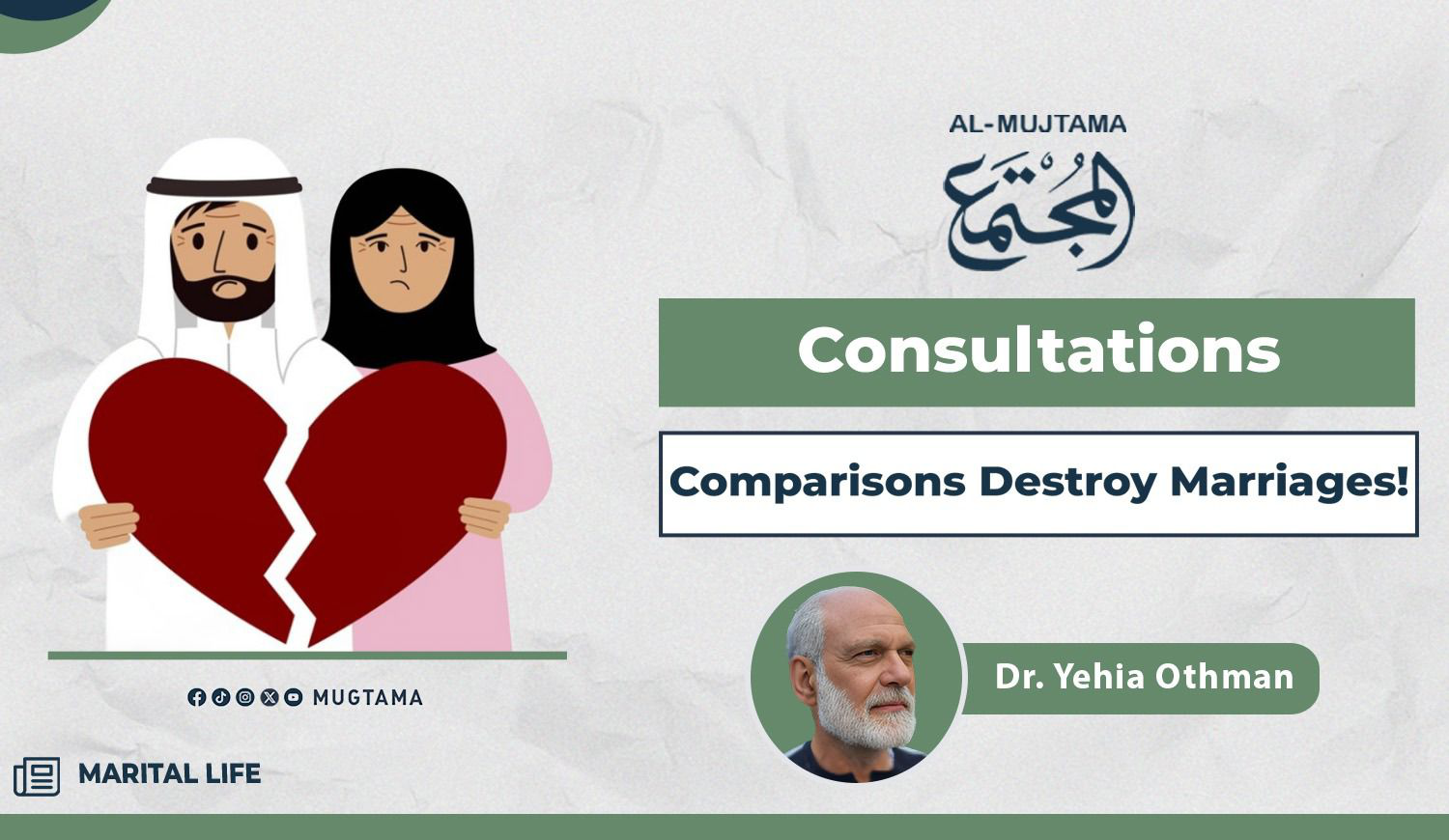Consultations
Comparisons Destroy Marriages!

My respected professor Dr. Yehia,
Peace, mercy and blessings of Allah be upon you.
With greetings of appreciation to Al-Mujtama Magazine, may Allah reward
all those who work on it with the best reward.
I am a businessman, blessed by
Allah with three children. My wife is a virtuous lady, fully devoted to caring
for us. Alhamdulillah we live in
harmony, except for one issue that threatens our happiness: comparison!
Despite Allah’s blessings upon
us, she sometimes compares me with others, her father, brothers, friends, or
even a character from a story she has read! Certainly, every person has a
quality I may lack. Likewise, she also compares herself with others, her
mother, sisters, or friends, and surely, she has qualities they lack as well.
The discussion grows long, and I
end up making a comparison myself—positive for me, negative against her—and it
all ends in a dispute! My wife is a reader of your esteemed magazine. Is there
a solution to our problem?
Understanding the Problem of “Comparison” Between Spouses
Allah SWT made marriage a bond of affection and mercy, not a battlefield of
comparison. Whether subtle—when a spouse silently compares their partner to
others without saying it—or direct—when comparisons are voiced openly—this
habit is harmful.
The one who compares often picks
the best quality in others and pits it against the weakest quality in their
spouse, ignoring context and individual circumstances. Marital relationships
are unique, with their own fingerprints, and each person has strengths and
weaknesses that the comparer may overlook.
Causes of “Comparison” in Marriage
There are multiple causes of
comparison, some psychological and others objective. While not an excuse, they
shed light on the roots of the issue.
A. Psychological Causes of Comparison
- Weak personality of the comparer: A
spouse may feel inferior and try to compensate by belittling their
partner, highlighting others’ strengths in comparison.
- Arrogance toward the partner: A
spouse may diminish their partner’s worth by pointing out that others are
superior, to maintain a sense of psychological balance.
B. Objective Causes of Comparison
- Failure to change behavior through advice:
When one spouse fails to persuade the other to adopt better behavior, they
may resort to comparisons as proof that the desired change is normal and
achievable.
- Mismatch with social expectations: A
spouse’s behavior may fall short of what is acceptable for the family’s
social status, causing embarrassment to the other.
The Negative Effects of Comparison Between Spouses
Comparing one’s spouse with
others is among the most dangerous causes of marital conflict, deeply affecting emotional and psychological stability. Some
of its negative impacts include:
- Contradiction to Islamic ethics:
Islam teaches covering faults and being grateful for blessings, not
belittling others. Abu Hurairah (may Allah be pleased with him) reported
that the Prophet (peace be upon him) said: “A
believer must not hate a believing woman; if he dislikes one of her
characteristics he will be pleased with another.” Comparison blinds one from appreciating
current blessings and focuses only on deficiencies, which is ingratitude
and undermines contentment.
- Feelings of inadequacy, jealousy, and doubt,
eroding appreciation and satisfaction.
- Retaliation: When a spouse feels
compared, they often retaliate with comparisons of their own.
- Ignoring the uniqueness of the marital
relationship.
- Magnifying negatives and erasing positives.
- Violation of human dignity
(breaking the principle of honor).
- Planting resentment and hostility
(breaking the principle of reconciliation).
Practical Solutions for Overcoming Comparison in Marriage
1. Contentment with What Allah Has Given
- Abu Hurairah reported that the Prophet (peace
be upon him) said: “Look at those who are
lower than you (financially) but do not look at those who are higher than
you, lest you belittle the favors Allah conferred upon you.” (Sunan At-Tirmidhi 2513)
- Cultivate gratitude:
Train yourself to value your spouse’s blessings and actions instead of
focusing on what is lacking.
- We are commanded to lower our gaze: {˹O Prophet!˺ Tell the believing men to lower their gaze and guard their
chastity. That is purer for them. Surely Allah is All-Aware of what they
do. And tell the believing women to lower their gaze and guard their
chastity.} [An-Nur 24:30–31] While the clear meaning
concerns guarding against immorality, could lowering the gaze also extend
to avoiding harmful comparisons that lead to envy? Allah knows best.
2. Overlooking Faults and Focusing on Positives
- No one is perfect: Successful marriage is
built on overlooking mistakes and excusing shortcomings. The saying “Seek
seventy excuses for your brother” means that before judging a person
negatively, one should search for many possible justifications. If this is
encouraged among Muslims in general, how much more so between spouses!
- Recognize strengths and weaknesses: Spouses
must understand each other, build on strengths, and work together on
weaknesses.
3. Promoting Positive Marital Dialogue
- Express needs with the language of love, not
criticism. Request improvement rather than demanding total change.
- Practice effective communication: Honest, calm discussions about feelings, without
comparisons or accusations, help resolve issues constructively.
4. Following the Example of the Prophet (Peace be
upon him)
- The Prophet (peace be upon him) was never
known to compare his wives. Instead, he appreciated each for her unique
qualities.
- Renew the intention of reform: Remember that
marriage is worship, and its goal is tranquility and mutual growth, not
competition with others.
5. Seeking Forgiveness and Practicing Taqwa
- Allah Says: {And
whoever is mindful of Allah, He will make a way out for them.} [At-Talaq
65:2] Taqwa
rectifies hearts and brings blessings into relationships.
6. Practicing Appreciation, Respect, and Gratitude
- Both spouses should respect and appreciate
one another, acknowledging and thanking each other for their efforts. As
the Prophet (peace be upon him) said: “Whoever
is not grateful to the people, he is not grateful to Allah.”
For Further Reading:
- How to Resolve Conflict between Spouses in Islam?
- My Husband Second Marriage Broke Me!
- 7 Essential Steps to Prevent Divorce
-------------------------------------------------------------











